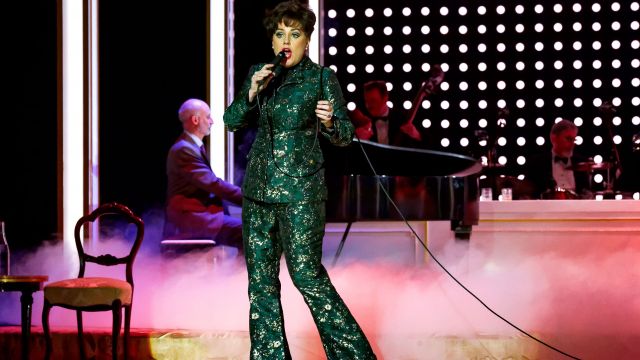End of the Rainbow
‘If I am a legend, then why am I so lonely?’ was Judy Garland’s plea near the end of her life and the theme explored by Peter Quilter in his play, End of the Rainbow.
Quilter takes us through Judy’s Garland’s last concert tour. At the Ritz hotel in London with her fifth husband Mickey Deans and accompanist Anthony we share her tears, fears and the pressure of fame, ill health and decaying relationships.
The play, on which the upcoming film Judy is based, is liberally laced with some of Garland’s greatest songs such as “Just in Time”, “You Made Me Love You”, “The Man That Got Away” and of course, “Over the Rainbow”.
Directed by Elena Carapetis, designed by Ailsa Paterson, musically directed by Carol Young and her band (with musical arrangements by Andrew McNaughton), the show runs at a frenetic pace that barely gives us time to breathe.
Micky Deans (Nic English) and accompanist Anthony (Stephen Sheehan) provide counterpoints to Judy’s life. They both want the best for her, firstly for her time on stage, which is the real drug that keeps her alive and secondly, for a quiet life, platonic love and care. Ironically, she can’t have both.
 English gives an intense performance as Mickey. He loves Judy, loathes her, is her fiancé and manager all at once, but always with love as the underlying reason for being with her. He skilfully portrays the rawness and youth that was Mickey Deans.
English gives an intense performance as Mickey. He loves Judy, loathes her, is her fiancé and manager all at once, but always with love as the underlying reason for being with her. He skilfully portrays the rawness and youth that was Mickey Deans.
Sheehan gives us wisdom, maturity and care for Judy but cannot give her what she really needs, an audience. His rejection by her in act 2 is beautifully handled. Sheehan is the master of stillness and silence.
Eddie Morrison plays multiple roles that add necessary detail to the play, particularly the hysterical radio interview with Judy.
Without a totally believable Judy Garland this play would collapse and Helen Dallimore gives the performance of a lifetime as the legend.
Everything is there, the hairstyle, makeup, costuming, but most of all her talent. She has mastered every nuance of Judy - her speaking voice, her strident powerful singing voice, the trembling of the lower lip when singing, and physicality of performance.
At times it is as though Garland has been reborn; we feel Judy’s every frustration, despair and joy as Dallimore takes us on the journey of her last days. At the end of what must be an exhausting performance, she is still there, belting out an encore.
As Judy, she says ‘I’m always alone out there’, but in this tight, ensemble-like piece the slickness and polish tell a different story.
End of the Rainbow is a beautifully crafted piece and a fitting tribute to the life, loves and songs that were and still are Judy Garland.
Barry Hill
Photographer: Chris Herzfeld
Subscribe to our E-Newsletter, buy our latest print edition or find a Performing Arts book at Book Nook.

